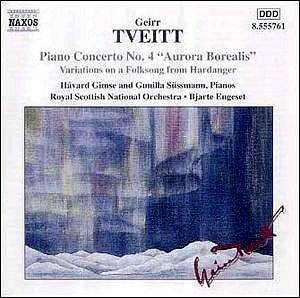I have always been drawn to Nordic music. Maybe it’s
the fact that my now-grey beard used to have lots of red in it. Maybe
there’s a Viking berserker hidden inside me, trying to break out. Whatever
the reason, I just plain like the music I hear coming
out of the Nordic nations – and this disc proves to be no exception.
This is raw powerful and emotional music that begs to be played again
and again – quite a discovery.
Tveitt’s music is new to me. If you’re expecting a
twentieth century Grieg, then think again! This is diabolical, demonic
music in places, redolent of Nordic sprites and nymphs but also, oddly,
containing something of the oriental, especially in the two-piano Variations.
Big-boned, structurally sound and harmonically intriguing, both works
are worthy of further study.
Looking up Tveitt’s biography led me to two conclusions.
One that he was an extremely unlucky man – he built his own house at
the end of an unmade road, which was inaccessible to a fire engine when
a devastating fire broke out in 1970, resulting in the loss of 80% of
his life’s work to that point! Second is that he lived in a different
world from the rest of us: he claimed his Piano Concert No. 3 was subtitled
"Homage to Brahms" because the composer had appeared to him
in a dream and dictated it! Even so, I don’t think I was quite prepared
for the effect his music had on me.
Sometimes known as the ‘Bartók of the North’
due to his almost obsessive collecting of folk tunes from the Hardanger
region of Norway, Geirr Tveitt studied in Leipzig, Vienna and Paris,
then became a teacher, critic and government music consultant in Oslo
during the early years of World War Two. Much of his music derives from
folk themes, and he uses ancient modes (which explains the oriental
and barbaric feel of his music in places) and texts from the Norse sagas.
Among his works are five operas (including one centred on the life of
Polar explorer Roald Amundsen), two ballets, six piano concerti (of
which two remain lost), two Hardanger fiddle concerti, two harp concerti
and a host of chamber music. Some of his larger orchestral works, reconstructed
by compatriots, have been released on the BIS label in recent years.
Among his collection of Norwegian music, Tveitt gathered
well over a hundred Hardanger folk tunes, and one of them forms the
basis for the first work on this disc, which is a single movement concerto
for two pianos in all but name. The primitive, modal nature of the music
makes it communicative at an almost visceral level – it is scarcely
subtle music, but it is absorbing! The Piano Concerto
No. 4 continues in similar vein, reminding the listener here of Rimsky-Korsakov
and Prokofiev, there of Neilsen and even shades of Malcolm Arnold peering
through!
The performances by Gimse and Süssmann are convincing
and show a deep feel for the music, ably steered through its occasionally
tortuous course by Bjarte Engeset – a conductor of whom, I suspect,
we are slated to hear more. The sound is as clear and rich as one has
come to expect of Naxos, and the notes live up to their usual informative
high standard. All in all, this is a release of fascinating twentieth
century music that should not be missed for its sheer eclecticism. It’s
not "essential listening" – but it will reward!
Tim Mahon


